The Bottom Line
The subject of abortion has been measured extensively in national surveys over the last 30 or so years and the resulting picture of public opinion is clear: Americans believe abortion should be legal, but on a somewhat limited basis.
Key Gallup Poll Measure
Do you think abortions should be legal under any circumstances, legal only under certain circumstances, or illegal in all circumstances?
Stability Over Time
A notable aspect of Gallup's long-term measure of public opinion on abortion is the consistency in Americans' outlook over the last quarter century. From 1975 through today, a majority of Americans have almost continually held that abortion should be legal "only under certain circumstances."
At the same time, there have been notable changes over the years in the balance of support for the more extreme opinions at either end of the abortion policy spectrum. In the initial years after the Roe v. Wade decision, the number of Americans holding the extreme positions was roughly the same, at the 20% level. In the 1980s, attitudes gradually shifted toward the pro-choice position, so that by 1990, the liberal extreme outnumbered the conservative extreme by a more than two-to-one margin. This trend peaked in June 1992, with 34% saying abortion should be legal in all cases and only 13% saying it should be completely banned. However, in 1996, a sharp reversal occurred, with a drop in the number holding the extreme pro-choice position (this fell to 22% by 1997) and more people taking the middle position -- saying it should be legal under certain circumstances (peaking at 61% in 1997). Most recently Gallup has found about a quarter of Americans (26%) saying abortion should be legal in all cases, a little over half (56%) saying it should be legal in certain cases and 17% saying it should be illegal in all cases.
Range of Opinion
Despite Americans' consistent judgement that abortion should be legal "under certain circumstances," there is a wide range of opinion about abortion when specific circumstances are detailed in question wording. Looking at a wide variety of questions on abortion across a number of survey organizations, support for the pro-choice position on abortion ranges from a high of 90% -- when the issue is whether abortion should be legal when the woman's life is at stake -- to a low of 7% when the issue is whether abortion should be legal in the third trimester of pregnancy.
Differences Within Population Subgroups
Abortion is often thought of as a women's issue, but polling data suggest, to the contrary, that the depth of one's religious beliefs, not gender, is what drives attitudes on abortion. The overwhelming majority of people who say religion is very important in their lives believe abortion should either be illegal or legal in only a few circumstances. Similarly, most people who say religion is not very important in their lives believe abortion should be legal in most or all circumstances. Gallup finds some differences in abortion attitudes according to respondents' age, education level, region of the country, political ideology and political party preference, but these patterns largely overlap with the underlying religiosity of these groups.
Pressure for Change
Americans support restrictions on abortion that, if enacted, would make abortion less accessible than it is today. But there is little evidence that the public is anxious to see these changes made. Abortion is not a critical issue for most Americans, and while the majority of respondents say they feel strongly about their views, few indicate that their support for political candidates depends on agreement over abortion, or that it is an important issue for candidates to discuss. Among the minority of Americans who are highly motivated on the abortion issue, the pro-life side has the edge, as those opposed to abortion tend to feel more strongly about their position and are more likely to base their vote choices on it than are those in favor of abortion rights.
Perceptions of Others' Opinions
Most Americans correctly perceive that the public at large takes the middle position on abortion, although the percentage who perceive this is larger than the actual percentage who take the middle position. At the same time, rather than view themselves as in the beleaguered minority, they tend to overestimate the proportion of Americans who share their own view, and underestimate the percentage who hold the most divergent view from their own.
Contents
- Introduction
- Should Abortion Be Legal in the United States?
- Restricting or Regulating Abortion
- Timing and Circumstance
- The Morality of Abortion
- Abortion as a Voting Issue
- Gender, Religion and Other Group Attitudes Toward Abortion
Introduction
Almost 30 years have passed since the landmark Roe v. Wade decision by the Supreme Court in 1973 sparked broad public interest in the legality of elective abortions. The political debate has come to hang on two terms: "pro-life" and "pro-choice," suggesting Americans fall neatly into one or the other category. Although Americans willingly categorize themselves with these terms, the vast body of poll data on this subject indicates that public opinion about abortion is much more complex than that.
It is clear that relatively few Americans want to see abortion legal in all circumstances and that even fewer favor banning all abortions. In some respects, there is widespread consensus about abortion policy that falls between these two extremes:
- Most Americans favor keeping abortions legal in the first trimester and in special cases involving the health of the woman or the health of the baby if it were to be born.
- Most Americans would outlaw abortions in the second and third trimesters and for matters of lifestyle choice (such as family finances).
- The public supports restrictions on abortion clinic protestors and tends to have a positive view of the landmark abortion rights case, Roe v. Wade.
- The public has widely supported each of several restrictive regulations proposed in recent years, such as a ban on so-called "partial-birth abortion," and requiring parental consent for minors, "informed consent" for women, and notification of husbands.
Despite these areas of consensus, Americans are closely divided when asked to associate themselves with either the pro-choice or pro-life label. Furthermore, polling has recorded deep fissures in public opinion in several specific abortion policy areas. The legality of the prescription abortion pill RU-486, U.S. funding of overseas family planning groups that promote or perform abortion, and equating abortion with murder are all areas that sharply divide the public.
The following chart illustrates the wide range of attitudes toward abortion recorded across a diverse set of questions about the subject. The figures in the chart are based on 146 survey questions asked by 18 different polling organizations over the past five years. The questions were drawn from the Roper Center online database of publicly released survey questions from 1996 to the present. All questions on abortion where the answers could be categorized as either pro-life or pro-choice in orientation were used. Where duplicate questions were asked by the same organization in that time period, only the most recent measure was included.
| Range of Support for Abortion |
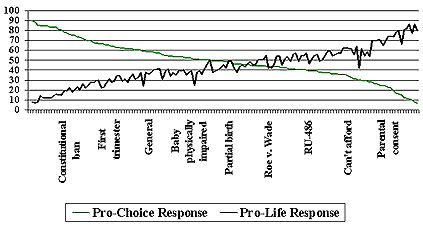 |
Areas of public consensus about abortion and areas of controversy are readily apparent in this chart, as is the variability in public support for abortion, depending on the specific circumstances or issue. The highest levels of support for legal abortions are found for cases where the health of the woman is at stake, or where the pregnancy is the result of rape. For example, in answer to the question "Please tell me whether or not you think it should be possible for a pregnant woman to obtain a legal abortion if the woman's own health is seriously endangered by the pregnancy?" -- asked by CBS News/New York Times in January 1998 -- 88% of Americans felt abortion should be legal. The same poll found 84% in favor of legal abortion when the pregnancy was caused by rape. Similar questions by Gallup and the Associated Press have documented the same levels of support for abortion under these circumstances.
The general order of support for the pro-choice position on abortion, ranging from the highest to the lowest levels of support, is as follows:
- Abortions to save the health or life of the woman (81%-90% support)
- Abortions for pregnancy caused by rape (74%-84% support)
- A constitutional ban on all abortions (59%-76% oppose)
- Abortions when the baby is physically impaired (49%-75% favor)
- Questions mentioning that a medical doctor is involved in making the abortion decision (59%-69% favor)
- In reaction to Roe v. Wade (43%-67% favor)
- Abortions in the first trimester (58-65% favor)
- Abortions when the baby is mentally impaired (39%-60% favor)
- Identification with the pro-choice vs. pro-life labels (43%-51% are "pro-choice")
- Support for U.S. funding of abortion-based family planning overseas (44%-50% favor)
- Legalizing the RU-486 abortion pill (39%-50% favor)
- Partial-birth abortion (10%-48% favor keeping it legal)
- Abortions for financial, work, school or other lifestyle reasons (25%-43% favor)
- Spousal consent (38% opposed)
- Abortions in the second trimester (15%-26% favor)
- Parental consent for minors seeking abortions (12%-28% opposed)
- Abortions in the third trimester (7%-13% favor)
- Informed consent for women seeking abortions (11% opposed)
The nature of Americans' reaction to abortion under different circumstances suggests that two competing values are in play in the formation of people's views: the desire to protect the mother's health and personal freedoms on one hand, and respect for the value of fetal life on the other. It also suggests that Americans attach much greater value to the fetus as it approaches viability, starting in the second trimester.
Other subtleties about public opinion on abortion are evident in the sensitivity of respondents to question wordings on the subject. For the most part, attitudes pertaining to particular aspects of abortion are consistent across differently worded questions. But in a few cases, particularly with respect to Roe v. Wade, the responses vary widely, depending on the information provided in the question.
The discussion below provides details about the nature of public opinion about abortion and focuses specifically on the following areas of the abortion debate:
- Basic attitudes about whether abortion should be legal
- Americans' identification with the ubiquitous "pro-life" and "pro-choice" abortion position labels
- Public reaction to the Roe v. Wade decision
- Attitudes toward current issues in the abortion debate, such as parental notification laws, informed consent laws, and the late-term abortion procedure widely known as "partial-birth abortion"
- Attitudes toward abortion among women, among religious groups, by age, and by other demographic factors
Should Abortion Be Legal in the United States?
Prior to the 1973 Supreme Court decision in Roe v. Wade, abortion was illegal in most states. The 5-4 decision favoring the plaintiff in this case defined a constitutional right to privacy on the basis of which the Court said abortion should be allowed in certain cases. Rather than offering a sweeping decision rooted in the importance of the right to privacy or the value of unborn life, the Court employed a continuum of fetal development along which the conflicting interests of the mother and the unborn child must be balanced at various stages of pregnancy. The result: three decades of political debate and polling about the legality of abortion under various specific circumstances and in each of the three trimesters. (One can imagine the different line of questions that would have ensued had the decision declared that life begins at birth rather than conception.)
Gallup's long-term measure of public opinion on abortion reflects this constitutional framework: Do you think abortions should be legal under any circumstances, legal only under certain circumstances, or illegal in all circumstances?
The public's answer to this question has remained fairly stable since it was first asked in 1975. For the most part, a majority of Americans have taken the middle position, saying abortion should be legal "only under certain circumstances."
Although the primary answer to this question has remained the same, there have been slight changes over the years in the balance of support for the more extreme opinions at either end of the abortion spectrum. In 1975, roughly the same percentage of Americans felt abortion should be "legal under any circumstances" as said it should be "illegal in all circumstances" (about 20% fell into each group). For the next 15 years, from 1975 through 1990, Gallup recorded a gradual shift toward the more liberal position, with the percentage supporting abortion in all cases increasing to 31% and the percentage thinking it should be illegal in all cases dropping to 12%. Between 1991 and 1995, the balance of opinion at the extremes remained fixed at a two-to-one ratio, with roughly 33% taking the extreme pro-choice view and about half that number taking the extreme pro-life view.
It is worth highlighting that in July 1996, coincident with the emergence of a new national debate over partial-birth abortion, Gallup recorded a significant drop in the number of Americans saying abortion should be legal in all cases. Since then, the percentage favoring unrestricted abortions has averaged just 25%, down from about 33% in the previous five years.
The Middle Group
Because it is often helpful to classify Americans as either "for" or "against" legal abortion, the large middle category of Americans saying abortion should be legal "only under certain circumstances" can be difficult to interpret. To help clarify its meaning, Gallup initiated a follow-up question in 1994, asking those who feel abortion should be legal "only under certain circumstances" whether they believe it should be legal "in most circumstances" or "only in a few circumstances."
By a more than two-to-one margin, Americans falling into the middle group take the more conservative position, saying that abortion should be legal in only a few circumstances. Combining these responses with the numbers who believe abortion should be legal in all cases or illegal in all cases, the public tilts in the conservative direction. A little more than half of American adults tend to believe abortion should be completely illegal or legal in only a few cases, while a little less than half believe abortion should be legal in all or most cases:
| Degree to Which Abortion Should Be Legal |
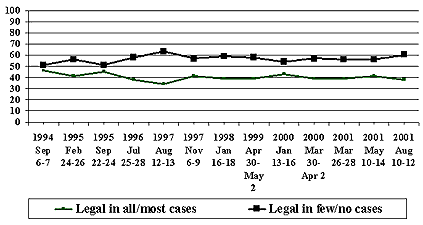 |
Perceptions of Public Opinion About Abortion
How do Americans gauge the views of others on this issue? Most Americans correctly perceive that the public at large takes the middle position on abortion, although the percentage who perceive this is larger than the actual percentage who take the middle position. Two-thirds of Americans (66%) believe the public at large believes abortion should be legal "only under certain circumstances" while in fact 58% of Americans hold this view. Americans are most accurate in estimating the number of extremely pro-life Americans, putting this at 11%, compared to the actual 15%. They tend to underestimate the proportion of extremely pro-choice Americans, estimating this as 16%, when the most recent survey puts it at 26%.
|
Actual vs. Perceived Public Attitudes Toward Abortion
|
||
|
Actual Views of Americans |
Perceived Views of Americans |
|
|
Legal in All |
26% |
16% |
|
Legal Only Under Certain |
58 |
66 |
|
Illegal in All |
15 |
11 |
As shown in the table below, Americans tend to overestimate the proportion of people who share their own view on abortion, and underestimate the percentage who hold the most divergent view from their own. A quarter of those who believe abortion should be legal in all circumstances believe the public shares their view -- slightly higher than the 16% who actually do. Similarly, nearly a quarter of those saying abortion should be illegal in all circumstances believe the public feels this way, compared to the actual rate of 11%.
|
Perceptions of Public's Attitudes on Abortion
|
||||
|
National Adults |
Respondents' View on Abortion |
|||
|
Perception of Public's View |
Legal in All |
Legal Only Under Certain |
Illegal in All |
|
|
Legal in All |
16% |
24% |
13% |
13% |
|
Legal Only Under Certain |
66 |
59 |
72 |
58 |
|
Illegal in All |
11 |
6 |
10 |
23 |
Americans also seem to be fairly accurate in estimating the proportion of Americans who consider themselves to be either "pro-choice" or "pro-life" on the abortion issue. A survey by the Wirthlin Worldwide organization in December 1996 found 51% of Americans believing that most Americans are pro-choice while 32% felt most are pro-life. Gallup polling in 1996 recorded attitudes very similar to these percentages, although, as discussed below, Americans have been less likely to call themselves pro-choice in subsequent years.
The Pro-Choice/Pro-Life Divide
Very often the abortion debate takes place in the political arena, where advocates of each side use the terms "pro-life" and "pro-choice" to represent their positions. Thus, learning how Americans identify with these terms is another important aspect of public opinion about abortion.
Americans are closely divided in their identification with the two terms today, with a slight plurality calling themselves pro-choice. Most recently, in an August 2001 Gallup survey, 46% said they consider themselves to be pro-choice and 46% called themselves pro-life. Responses to this question have been fairly stable over the past five years; however, prior to 1996, Americans were more likely to call themselves pro-choice than they are today. (As noted below, the debate over partial-birth abortion became highly visible in 1996, and may have altered public perceptions of abortion more generally.)
| Pro-Choice vs. Pro-Life |
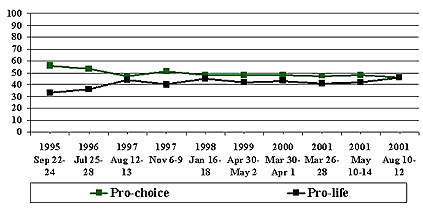 |
So what is in a name? How do adherents of each abortion label feel about the legality of abortion in general as well as in specific cases?
Nine in 10 Americans who identify with the pro-life side of the debate tell Gallup they believe abortion should be highly restricted. Fifty-nine percent of pro-life adherents believe it should be legal in only a few cases and another 31% believe it should be illegal altogether. Very few "pro-life" Americans say abortion should be legal in all cases (4%) or in most cases (5%).
Pro-choice adherents are a bit less harmonized in their views. Half of pro-choice Americans (50%) believe abortion should be legal in all cases, but the remainder are split between those who think it should be legal in most cases (19%) and those who say it should be legal in only a few cases (27%).
| Pro-Choice vs. Pro-Life Attitudes About Legality of Abortion |
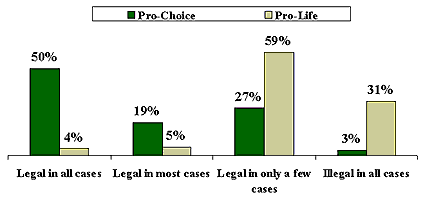 |
| Aug. 10-12, 2001 |
Looking at these numbers in reverse, we can see that the two more liberal positions on the legality of abortion are held primarily by people who consider themselves to be pro-choice. Similarly, the vast majority of those who hold the most conservative position on abortion are pro-life. However, while the majority of those who hold the relatively conservative position on abortion that abortion should be "legal in only a few" cases are pro-life, a substantial minority of this group, 29%, is comprised of pro-choice adherents.
| Use of Abortion Label Depending on Abortion Position Favored |
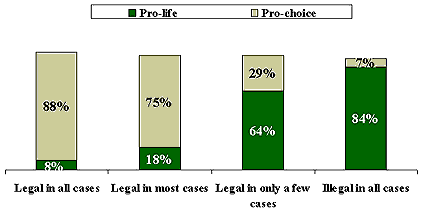 |
| Aug. 10-12, 2001 |
Why do a substantial minority of people who believe in severe restrictions on abortion nevertheless call themselves pro-choice? There is no clear answer to this, but it could be because they believe that to be pro-life, one must oppose abortion in all circumstances. Alternatively, it could be because they feel so strongly about the limited circumstances under which they favor legal abortion that the value inherent in those choices is paramount to them.
We can learn more about the nature of beliefs held by pro-choice and pro-life Americans by looking at their views about abortion in several specific circumstances. A Gallup Poll conducted in March 2000 asked Americans whether abortion should be legal or illegal in each of 12 situations.
Wide variation exists between the views of pro-life and pro-choice adherents, but in six areas, a majority of both groups agree. In three areas, a majority of pro-life and pro-choice Americans favor legalized abortion. These are:
- Abortion to save the life of the woman
- Abortion in cases where the pregnancy was caused by rape or incest
- Abortion when the woman's physical health is at risk
In another three areas, a majority of the two groups oppose legalized abortion. These are:
- Abortion in the 2nd trimester
- Abortion in the 3rd trimester
- "Partial-birth" abortions
In all other areas measured, the majority of pro-choice and pro-life adherents disagree about whether abortion should be legal or illegal.
- The greatest degree of disagreement is with respect to abortions in the first trimester: 90% of pro-choice respondents think this should be legal while 58% of pro-life respondents think it should be illegal.
- Substantial disagreement also exists over abortion for financial reasons, when the baby may be physically or mentally impaired, for the mental health of the woman, as well as in terms of legalizing the French abortion pill known as RU-486.
In all of these areas the vast majority of pro-choice adherents feel abortion should be legal, while pro-life adherents feel it should be illegal.
Roe v. Wade
The 1973 Supreme Court decision in Roe v. Wade launched a political battle over the legality of abortion that continues to this day. As a result, public opinion about the precedent-setting court case continues to be an important part of the debate. However, this proves to be one of the trickier areas of measurement of public opinion. Most survey questions about Roe v. Wade provide the respondent with information about the case, and these details appear to have a major impact on the answers.
The highest level of support for Roe v. Wade measured by polling in the past five years is found in an October 2000 Gallup question asking respondents whether, given the opportunity, they would vote "for or against a constitutional amendment that would overturn the Roe vs. Wade decision, and make abortion illegal in all states." Two-thirds of Americans (67%) said they would oppose this, while only 30% favored it.
The lowest level of support for Roe v. Wade recorded in recent years (43%) comes from a June 2000 Los Angeles Times poll. Their question reads: "As you may know, the United States Supreme Court handed down a landmark decision more than twenty-five years ago, called Roe versus Wade, which legalized abortion. Generally speaking, are you in favor of the Supreme Court decision which permits a woman to get an abortion from a doctor at any time, or are you opposed to that, or are you indifferent on the subject -- or haven't you heard enough about that yet to say?"
By contrast, a number of poll questions about Roe v. Wade posed by other survey organizations state that the Supreme Court legalized abortion only in the first three months. These questions produce levels of support for the case ranging from 55% to 64%.
Although survey references to a medical doctor participating in an abortion decision seem to increase respondents' support for abortion rights, in the case of the Roe v. Wade questions reviewed here, the more critical factor appears to be the characterization of the timeline of the legality. If Roe v. Wade is presented only as legalizing abortion in the first three months, support for the decision is much higher than if it is characterized as making abortion legal throughout pregnancy or for any reason.
An Associated Press question appears to tap several competing values, asking "The U.S. Supreme Court ruled in 1973 that a woman can have an abortion if she wants one at any time during the first three months of pregnancy. Do you favor or oppose that ruling?" Given the relatively low support for Roe v. Wade in the result (only 49% favor the ruling as described by the AP), it appears that the nuances in the phrase "that a woman can have an abortion if she wants one at any time" had a greater impact on respondents than the fact that the question also mentioned the ruling was limited to the first trimester.
| Range of Support for Roe v. Wade - Part 1 |
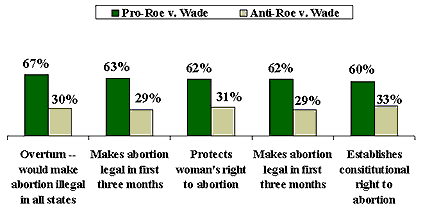 |
| Range of Support for Roe v. Wade - Part 2 |
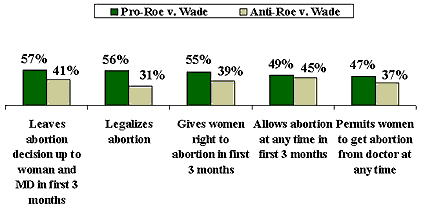 |
Restricting or Regulating Abortion
Rather than tackling a complete ban on abortion or a sweeping overthrow of Roe v. Wade, opponents of abortion have, in recent years, taken an incremental approach to achieving their goals. According to publicagenda.org1, 31 states have enacted bans on partial-birth abortion, 31 states require parental consent or notification before a minor has an abortion, 14 states require a waiting period before a woman seeking an abortion can obtain one, and 31 states have enacted three or more types of restrictions.
Writing for the majority in the Supreme Court's 1989 Webster vs. Reproductive Health Services decision, Chief Justice Rehnquist noted that there was no need for the court to overturn Roe v. Wade, but recommended, "We would modify and narrow Roe and succeeding cases" given the opportunity.2
Surveys document widespread public support for many of the types of abortion restrictions being debated in the legislatures and courts. (No doubt the widespread public support for these measures is one reason that abortion opponents have chosen these issues to pursue.)
- Informed Consent. More than eight in 10 Americans (86% in a 1996 Gallup survey) support the concept of informed consent, in which doctors must inform their patients about alternatives to abortion before performing the procedure.
- Spousal Notification. More than two-thirds (70% in the same Gallup survey) support a requirement that husbands be notified if a woman decides to have an abortion.
- Parental Consent. Seven in 10 or more (ranging from 69% in a 1999 Pew survey to 82% in a 2000 Los Angeles Times survey) support a requirement that women under 18 have parental consent before having an abortion.
- Waiting Period. Roughly three-quarters (74% in a 1996 Gallup survey and 79% in a 1998 CBS/New York Times survey) favor requiring women to wait 24 hours once they request an abortion before the procedure can be performed.
- "Partial-Birth" Abortions. A majority of Americans, ranging from 59% to 77%, favor making illegal a late-term abortion procedure widely referred to as "partial-birth abortion."
A question regularly asked in the CBS/New York Times poll confirms that Americans have a generally conservative reaction when asked about abortion restrictions. The poll asks: "Which of these comes closest to your view -- abortion should be generally available to those who want it, or abortion should be available, but under stricter limits than it is now, or abortion should not be permitted?" According to their most recent asking, in July 2000, only 34% of Americans believe abortion should be generally available. The plurality, 40%, believe it should be available but under stricter limits, while an additional 22% believe it should not be permitted at all.
Some other restrictions on access to abortion that come up from time to time are more controversial. Chief among these is the legality of the newly approved prescription abortion drug, RU-486. Abortion opponents unsuccessfully fought to keep the Food and Drug Administration from approving the drug's use in the United States. But Americans are closely divided about the matter, with support for making it legal ranging from 39% to 50%, depending on the specific question, and opposition ranging from 36% to 47%.
Another abortion-restricting policy Americans are not convinced of is the so-called "Mexico City Policy" whereby the United States withholds foreign aid from family planning groups that promote or perform abortion. (Ronald Reagan announced his support for this policy at a conference in Mexico City in 1984 and Bill Clinton reversed it in one of his first acts as president in 1993.) A Newsweek poll conducted in February 2001 found a slim plurality of Americans (50% to 42%) in favor of President Bush's recent executive order blocking all U.S. funding to overseas family planning groups that offer abortion counseling. Similarly, in March, the Los Angeles Times found the public evenly divided over the policy, with 46% in favor and 45% opposed.
Partial-Birth Abortion
Given the prominence of the partial-birth abortion issue in recent years, it is useful to pause for a moment to explore public attitudes about the issue in greater depth.
The issue of partial-birth abortion has been measured by a number of polling organizations over the past five years. While the wordings differ widely, most questions on this subject make reference to the term "partial-birth abortion," often elaborating that it is a "late-term" procedure or that it is conducted in the last six months of pregnancy.
Gallup's standard wording reads: "Would you vote for or against a law which would make it illegal to perform a specific abortion procedure conducted in the last six months of pregnancy known as a 'partial-birth abortion,' except in cases necessary to save the life of the mother?" When last asked, in October 2000, 63% of Americans told Gallup they would vote for such a law; just 35% were opposed.
The ongoing legal and policy debate over partial-birth abortion was launched in June 1995 when Senator Robert Smith, a Republican from New Hampshire, introduced a bill in the U.S. Senate to ban the procedure. A House bill soon followed and by the fall of that year, political debate over the issue was in full swing. A bill banning partial-birth abortion passed the House in November 1995; it passed the Senate, with changes, in December 1995. The final compromise bill passed the House in March 1996. Full media attention was brought to bear on the issue in April 1996, when President Clinton vetoed the bill for the first time.
In April 1996, two weeks after President Clinton's first veto, Gallup found 57% of Americans in favor of making partial-birth abortions illegal, except in cases necessary to save the life of the mother (an exception contained in the congressional bills). Just 39% of Americans were opposed to such a ban. This opposition has held up in all subsequent Gallup surveys on the subject.
| Partial-Birth Abortion |
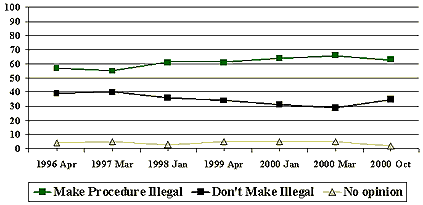 |
There is some evidence that the debate over partial-birth abortion in 1996 caused a shift in public attitudes more generally. At the same time that Gallup found the public opposed to partial-birth abortion, it recorded a significant drop in the number of Americans holding the view that abortion should be legal "under any circumstances." Roughly one-third had held that extreme liberal position since the early 1990s, but in 1996 that dropped to roughly one-quarter, where it has remained since.
Two aspects of this adjustment make it unprecedented. First, it happened quickly, occurring between September 1995 and July 1996. Second, it represents the first time since Gallup began asking its principal abortion question in 1975 that opinion on the issue shifted in a significant and sustained way to the conservative side, rather than to the liberal side.
Given the timing of the shift, it appears that the debate over partial-birth abortion is the cause for this adjustment in public attitudes. It appears that partial-birth abortion became an important factor for Americans to consider when crystallizing their own positions on abortion. Specifically, partial-birth abortion became a widely familiar "circumstance" in 1996 that some people who previously favored "abortion in all circumstances" may have had in mind when they moved into the "only certain circumstances" category. Indeed, a large number of Americans who generally think abortion should be legal in all cases, nevertheless say they favor a ban on partial-birth abortion (57%, according to a March 2000 Gallup poll). Thus, the potential for this issue to move some of these people into the "only certain circumstances" category is clear.
Timing and Circumstance
One way to understand the nature of the complex pattern of public support given to abortion in the aforementioned cases is to look at each result in terms of the timing of abortion within a pregnancy and the circumstances under which abortion is conducted.
In general, a majority of Americans are tolerant of abortion in the first trimester (averaging 62% across several polling organizations since 1996), a majority oppose it in the second trimester (67%) and most oppose it in the third trimester (82%).
Americans are not entirely consistent about these views, however, when asked about some specific procedures that are generally identified with a specific trimester. When asked about the prescription abortion pill RU-486 -- which is primarily used in the first trimester and which will be marketed in the United States under the label "Early Option Pill"3 -- the public is fairly critical. Only 39% of Americans in a March 2000 Gallup poll said they favored its approval for use in the United States while 47% objected. At most, the major polling firms have found 50% of Americans supporting the use of RU-486 in the United States (CBS/New York Times in January 1998).
Despite the high level of disapproval for abortions in the second and third trimesters, Americans are somewhat less critical of late-term abortions when asked about the specific late-term abortion procedure known as partial-birth abortion. Although a majority of Americans generally disapprove of the procedure, the level of disapproval recorded across several survey organizations ranges from 54% (according to a 1997 Pew survey) to 77% (according to a 1998 Market Strategies survey), with the average disapproval score being 62% -- somewhat lower than the average disapproval for second and third trimester abortions (75%).
With respect to circumstances, most Americans agree that abortion should be available when there is a medical problem, whether involving the woman or the fetus. They generally disapprove of abortion in cases involving lifestyle decisions. Public opinion surveys indicate the following rank order of approval for abortion under specific circumstances:
|
Average rate of support for legal abortion across multiple survey organizations since 1996 |
|
|
Life of the woman |
84% |
|
Physical health of the woman |
83% |
|
Rape or incest |
79% |
|
Mental health of the woman |
64% |
|
Baby would be mentally impaired |
53% |
|
Baby would be physically impaired |
51% |
|
Would force teenager to drop out of school |
42% |
|
Woman/family can't afford the baby |
39% |
|
Woman/family want no more children |
39% |
|
Couple does not want to marry |
35% |
|
Fertility selection (when fertility process creates multiple embryos) |
29% |
|
Would interfere with woman's career |
25% |
Again, however, Americans are not perfectly consistent about these judgements when faced with more specific examples. In 1997, Gallup asked Americans whether they supported abortion for each of three types of health problems in babies, including one of the conditions for which pregnant women most commonly undergo prenatal testing, Down syndrome.
Despite Americans' general support for abortions in the case of mental impairment (53%), a majority disagrees with abortion in cases where prenatal testing indicates "mental retardation such as Down syndrome." Only 39% say abortion in this case would be morally acceptable while 51% say it would be morally wrong. However, the same poll found Americans to be fairly consistent with their general support for abortion for reasons of physical impairment in babies. The plurality of Americans, 49%, said it would not be morally wrong for a woman to have an abortion in cases where prenatal testing indicates "a condition that would cause chronic health problems or death in early adulthood such as Cystic Fibrosis." Similarly, 52% accept the morality of abortion when testing indicates "a disease that could lead to the child's death within five years, such as Tay-Sachs disease."
The Morality of Abortion
Asked about the morality of abortion in general, Americans are evenly divided: 42% told Gallup in a May 2001 survey that abortion is morally acceptable while 45% answered that it is morally wrong.
Asked whether abortion is murder, slightly differently worded questions have produced slightly different rates of agreement, ranging between 45% and 57%. Questions that ask whether abortion is an "act of murder" tend to produce answers that are slightly lower than those that simply ask whether abortion is murder.
- Do you agree or disagree with this statement? Abortion is murder.
Los Angeles Times, June 2000: 57% agree; 36% disagree
- Which of these statements comes closer to your opinion: Abortion is the same thing as murdering a child, or abortion is not murder because the fetus really isn't a child?
CBS/New York Times, January 1998: 50% murder; 38% not murder
- Do you think abortion is an act of murder, or don't you feel this way?
CNN/USA Today/Gallup Poll, January 1998: 48% murder and 45% don't feel this way
- What is your view -- do you think abortion is an act of murder, or don't you feel this way? Time/CNN, August 1994: 43% murder; 47% don't feel this way
A unique question asked by the Center for Survey Research at the University of Virginia explored Americans' feelings about abortion as murder in greater detail. Given four categories to choose from, a combined 48% indicate abortion is murder while 42% say it is not murder -- very similar to the Gallup's 1998 findings. However, as can be seen, about one-fifth of those who consider abortion murder make a distinction between abortion and killing a person who is already born. On the other side, two-thirds of those who do not consider abortion murder nevertheless perceive it as the taking of human life. Only 16% of Americans view it as a surgical procedure for removing human tissue.
|
Which of these statements best describes your feelings about abortion? Abortion is just as bad as killing a person who has already been born, it is a murder. Abortion is murder, but it is not as bad as killing someone who has already been born. Abortion is not murder, but it does involve the taking of human life. Abortion is not murder, it is a surgical procedure for removing human tissue?
University of Virginia, January 1996 |
|
|
Murder, as bad as killing person already born |
38% |
|
Murder, not as bad as killing a person already born |
10 |
|
Not murder, does involve taking human life |
26 |
|
Not murder, is a surgical procedure for removing human tissue |
16 |
|
No opinion |
11 |
One refrain sometimes heard in the abortion debate is "I am personally opposed to abortion, but I would not impose my beliefs on others." In fact, for a majority of Americans, their personal judgement about the morality of abortion and their views about its legality are in general alignment. Moreover, very few Americans appear conflicted in the described way. According to Gallup's May 2001 survey on abortion, only 5% of all Americans simultaneously believe abortion is morally wrong and that it should be legal in all or most circumstances.
Most of those saying abortion is morally acceptable (72%) believe abortion should be legal in all or most circumstances, while a somewhat larger number (87%) of those who say abortion is morally wrong believe it should be legal in only a few or no circumstances. As shown in the chart below, the relationship between one's personal belief about an issue and one's attitudes toward how society should treat it is fairly consistent across a variety of issues, with two exceptions. A relatively large number of those saying abortion is not morally wrong, nevertheless feel abortion should be legal in only a few circumstances (26%) -- putting them into the "generally illegal" category. A similar degree of inconsistency is seen among those who believe that doctor-assisted suicide, also known as euthanasia, is morally wrong, with 27% of this group nevertheless believing it should be legal.
| Morality vs. Legality |
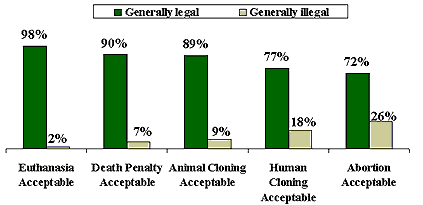 |
| May 2001 |
| Morality vs. Legality |
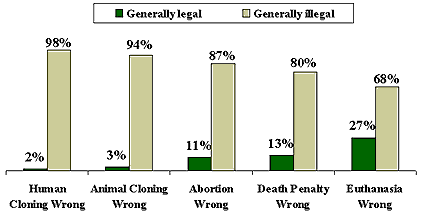 |
| May 2001 |
Abortion as a Voting Issue
The Democratic Party stands behind the right of every woman to choose, consistent with Roe v. Wade, and regardless of ability to pay. We believe it is a fundamental constitutional liberty that individual Americans -- not government -- can best take responsibility for making the most difficult and intensely personal decisions regarding reproduction. This year's Supreme Court rulings show to us all that eliminating a woman's right to choose is only one justice away. That's why the stakes in this election are as high as ever. -- 2000 Democratic National Party Platform4
Abortion appears to be critical, politically speaking, to a fairly small handful of Americans. Overall, it ranks low on the list of issues Americans want to see their candidates discuss during elections, and according to exit polls, it is only moderately important relative to other factors Americans consider when voting for president.
Gallup polls during the 1992, 1996 and 2000 presidential cycles document that abortion ranks in the bottom tier of issues Americans care about in campaigns. In January 2000, abortion was one of only four issues, out of 25 measured by Gallup, which less than a majority of Americans rated as highly important to them in voting for president. Just 47% said abortion policy was extremely or very important to them in voting for president, compared to 85% who rated education policy (the most highly rated issue) as this important.
The importance of abortion appears slightly greater according to exit poll results. In recent years, most exit polls have asked Americans some variant of the question "Which one or two issues mattered most in deciding how you voted?" -- followed by a list of 8-11 issues from which to chose.
In the 2000 election for president, 14% of voters nationwide indicated that abortion was one of the top issues of importance to them in deciding how to vote.5 This put abortion well below morals/ethical values, the economy and education in importance, but above the environment, health care, foreign affairs, and several other issues. The full results of the 2000 Los Angeles Times exit poll results to this question are shown below:
|
Morals/Ethical values |
35% |
|
The economy |
26 |
|
Education |
25 |
|
Social Security |
21 |
|
Taxes |
17 |
|
Abortion |
14 |
|
The environment |
9 |
|
Health care |
8 |
|
Prescription drugs |
8 |
|
Budget surplus |
6 |
|
Foreign affairs |
5 |
As the chart below shows, from 1984 to 2000, the percentage of Americans indicating that abortion was a top issue for them in choosing a president ranged from 7% to 14%.
|
Percentage Citing Abortion as One of Most Important Issues |
|
|
Presidential Election |
% Choosing Abortion |
|
2000 |
14 |
|
1996 |
9 |
|
1992 |
12 |
|
1988 |
7 |
|
1984 |
8 |
To evaluate the direct effect of the abortion issue on the outcome of presidential elections it is important to know the candidate preference of voters choosing abortion as a key issue, rather than merely knowing how many say the issue per se is important to them. As noted by Everett Carll Ladd and Karlyn H. Bowman7, "Small numbers of voters have said that abortion was the most important issue to them in casting their votes, and at this level, the issue has been a plus for the GOP."
Among the 14% of voters who selected abortion in 2000, 58% voted for George W. Bush and 41% voted for Al Gore. Given the close vote margin (less than one percentage point) between Bush and Gore in this election, the issue could have been pivotal in Bush's victory. (Of course, given the close margin, any number of other issues may have been pivotal as well.)
|
Impact of Abortion Issue on 2000 Voters for President |
|
|
Abortion Voters Supporting Bush (58% of 14%) |
8.1% |
|
Abortion Voters Supporting Gore (41% of 14%) |
5.7% |
|
Net Abortion Vote for Bush |
+2.4% |
For all 6 presidential elections between 1984 and 2000, the abortion issue has been an advantage for Republican candidates, suggesting that, on average, pro-life Americans are more ardent about their position than pro-choice Americans.
|
Vote Choice Among Those Citing Abortion as Most or One of Most Important Issues |
||||
|
Presidential Election |
% Choosing Abortion |
Voted for Republican |
Voted for Democrat |
Net Advantage to GOP |
|
2000 |
14 |
58 |
41 |
+2.4 |
|
1996 |
9 |
60 |
34 |
+2.3 |
|
1992 |
12 |
55 |
36 |
+2.3 |
|
1988 |
7 |
63 |
36 |
+1.9 |
|
1984 |
8 |
71 |
28 |
+3.4 |
The advantage to the GOP of the abortion issue is shown in a separate Gallup question asking Americans about the importance of a candidate's stand on abortion to their willingness to support that person. The overall results show that just 20% of Americans would only vote for a candidate who shared their views on abortion. Another 51% say they consider a candidate's position on abortion as just one of many important factors while 27% say abortion is not a major issue.
But there is a large difference in the importance of abortion according to one's position on the issue, with the greatest level of single-issue voting intent seen among those most adamantly opposed to abortion. More than four in ten extremely pro-life Americans (41%) say they would only vote for a candidate who shares their views, compared with 23% of extremely pro-choice Americans. Conversely, close to a third of extremely pro-choice Americans (30%) say abortion is not a major issue to them, compared to just 10% of extremely pro-life Americans.
| Importance of Abortion to Vote Choice |
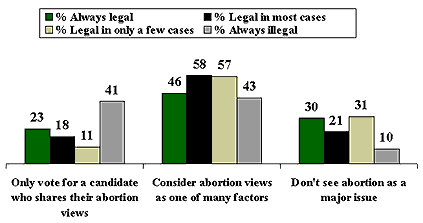 |
Because a relatively small number of Americans hold the "always illegal" position, their intensity does not translate into an enormous number of votes for pro-life candidates or the Republican Party which is the primary beneficiary of these votes. Overall, only about 10% of all Americans can be classified as single issue pro-life voters, while about 8% can be classified as single issue pro-choice voters, yielding just a two percentage point advantage for the pro-life side at the voting booth. This is nearly identical to the 2.4% net advantage to George W. Bush in the 2000 presidential election, as documented by the Los Angeles Times exit poll.
Gender, Religion and Other Group Attitudes Toward Abortion
Abortion is often referred to as a "women's issue," perhaps contributing to the idea that women are more supportive of abortion rights than are men. But polling documents relatively small differences between men and women on the subject of abortion. In Gallup's most recent measure, women are just slightly more likely to hold the position that abortion should be legal under all circumstances.
| Legality of Abortion by Gender: May 2001 |
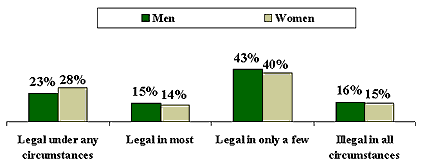 |
| May, 2001 |
This pattern is consistent with Gallup's trends on this question, which show that since 1975, similar percentages of men and women have said abortion should be legal in all cases, with women tending to be slightly more likely than men to hold this view.
| Gender and Abortion: 1975-2001 Percentage Saying Abortion Should Be Legal Under Any Circumstances |
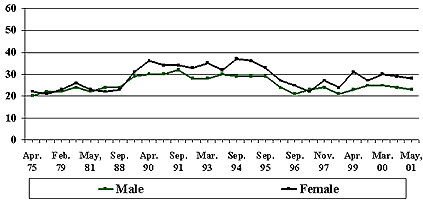 |
Rather than gender, orientation toward religion appears to be one of the most important factors related to abortion attitudes. Highly religious Americans tend toward the more pro-life categories in Gallup's four-point measure of abortion attitudes, while non-religious Americans are mostly pro-choice.
| Detailed Abortion Views, by Religion: May 2001 |
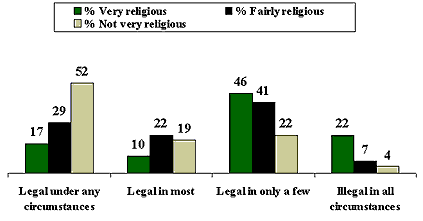 |
| May 2001 |
The sharp difference between religious and non-religious Americans is even more apparent when their support for abortion is collapsed into the two summary categories: those who favor abortion in all or most cases and those who favor it in only a few cases or no cases. Two thirds of very religious Americans (68%) think abortion should be legal in few or no cases, almost exactly the same as the percentage of non-religious Americans who think abortion should be legal in all or most cases (71%).
| Summary of Abortion Views, by Religion: May 2001 |
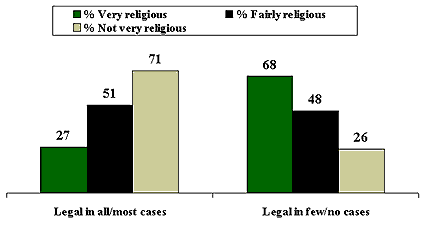 |
| May 2001 |
Previous research by Gallup on this subject shows that this difference in abortion opinion among people of various levels of religious commitment holds true whether looking at Catholics, Protestants, or born-again Christians. The most deeply religious people in each faith are always much more inclined to the pro-life position than those who are less devout.
Other divergences that have long been apparent in Gallup's 26-year tracking of abortion sentiment include age, education, income, political ideology and political affiliation. Older Americans, Republicans, self-described "conservatives," those with no college education, and low-income Americans tend more toward the pro-life positions than do their counterparts. Americans living in the South and Midwest are also more supportive of strict limits on abortion than those in the East and West are. But, these groups which are most conservative on abortion, also report much higher religious commitment in their lives.
The following graphs detail support for the more pro-life oriented positions among various groups, and illustrate these differences.
| Support for Major Restrictions on Abortion % Legal in Few/No Cases |
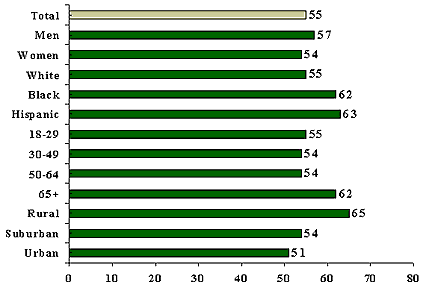 |
| Jan. 2000 -- May 2001 |
| Support for Major Restrictions on Abortion % Legal in Few/No Cases |
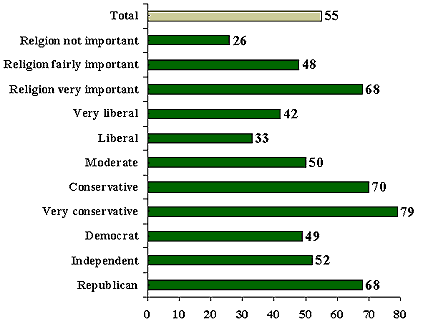 |
| Jan. 2000 -- May 2001 |
| Support for Major Restrictions on Abortion % Legal in Few/No Cases |
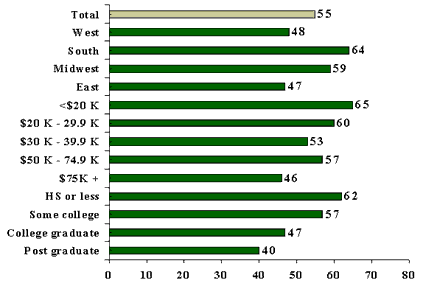 |
| Jan. 2000 -- May 2001 |
1http://www.publicagenda.org/issues/overview.cfm?issue_type=abortion (source: Alan Guttmacher Institute)
2http://www.forerunner.com/forerunner/X0482_Supreme_Court_Uphold.html
3http://www.religioustolerance.org/aboru486.htm
4http://www.democrats.org/issues/platform/platform.html
52000 Los Angeles Times Exit Poll as reported by L.A. Times Poll Director, Susan Pinkus
6Ladd, E. C. & Bowman, K. H. (1997). Public Opinion About Abortion: Twenty-Five Years After Roe v. Wade. The AEI Press, Washington, D.C.
7Ladd & Bowman, p. 17
8Ladd & Bowman.